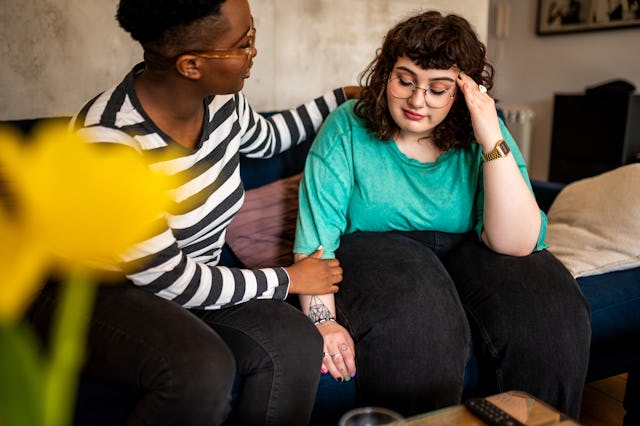9 Common Phrases Your Newly Divorced Friend Doesn’t Really Want To Hear
A psychologist shares what you can say instead.

When Elizabeth Cohen was recently divorced, she'd often hear responses from others like: "OMG, I'm so sorry," "That's so terrible," and "Are your kids doing OK?"
Those are exactly the types of phrases she didn't want to hear. Rather than really listening to what she was going through, she felt these responses projected other people's opinions and judgments. "[Insead], I would love someone to say, 'How brave of you… what's this been like for you? How can I support you?" she says.
We talked to Dr. Cohen, who is also a psychologist and author of Light on the Other Side of Divorce: Discovering the New You, about common phrases that can actually be damaging to say to someone who is divorced — even if you mean well — and what you can say instead.
The Potentially Problematic Phrases
1. I'm so sorry.
While it may sound sympathetic, this assumes what a person's experience is like rather than listening and understanding where they are coming from. "Many people leave relationships that are not working for them, which is actually a really strong behavior and something that could be honored and valued," Cohen tells Scary Mommy. "Saying 'I'm so sorry' is implying that it is a bad thing."
2. How are the kids doing?
This question puts the focus on the kids rather than the person you're talking to and can also come off as critical. "Many people are afraid to get divorced because of the way it impacts the kids, and so I worry this kind of question might come across as accusatory," Cohen explains.
3. I never liked them anyway.
This phrase could seem unsupportive and even insulting, like you're questioning your friend's judgment. "That's just basically throwing salt in the wound and being like, 'Why did you stay so long? That [person] sucks.'"
4. You seemed so happy together.
Another unsupportive phrase that can imply: Why would you get divorced? Why would you make such an impulsive decision? "As if you hadn't thought so hard about why," Cohen says. "I think it takes an average of seven years for people to finally leave … so the idea that people [divorce] impulsively is wildly inaccurate."
5. Did you try to work it out?
This conveys the message: If you had tried harder, maybe this wouldn't be happening. "This kind of obsession with sticking things out or avoiding ending situations and calling things what they are is really a cultural problem," Cohen says.
6. Would you consider dating or marrying someone else?
If someone felt betrayed in their last relationship, they probably are not thinking about pursuing intimacy again right now. "These questions are such an indication of discomfort with just being in the unknown," Cohen shares. They're missing the point of being supportive. Another point? Not everyone wants to be in a monogamous relationship, so this question is not particularly inclusive.
7. I'm divorced, and it's the worst.
This can be invalidating and, again, projecting your own experience. It can signify that you haven't processed your frustrations and are projecting them onto your friend.
8. Did you get the house?
Anything about finances should be avoided. The focus should be on whether the person feels safe and secure rather than how much money they received or material things they were able to keep.
9. Let me know if you need anything.
When someone's going through a divorce, they have a lot on their plate, and it can be tough to ask for help. While the sentiment behind this is thoughtful, it can be more helpful to say to a friend, "How can I best support you? What do you think you need right now?" If your friend says they don't know, offer specific ideas like babysitting their kids, bringing a meal or groceries, or helping with laundry.
Phrases to Try Instead
The bottom line: Avoid black-and-white statements or questions that require a yes-or-no answer. Ask open-ended questions that encourage your friend to share more.
Some of Cohen's go-to phrases for acknowledging someone's experience while also being their cheerleader include:
- "You're super brave."
- "Your kids are so lucky to have you."
- "You're still not alone."
- "You will get through this."
- "How can I support you?"
- "What's this been like for you?"
- "What do you need from me?"
- "What do you want to share?"
These provide a safe space and allow for nuances instead of judgments, Cohen says. "And they allow for people… to know they can come back to you if they need more support."